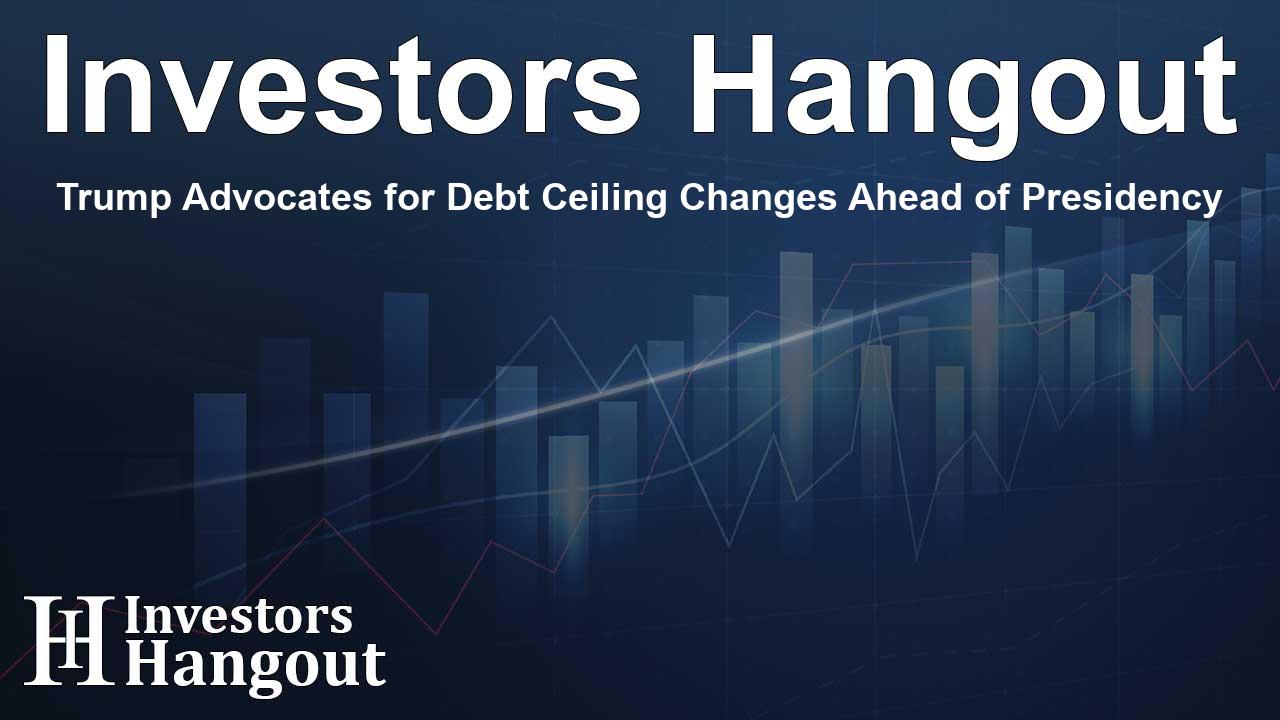Trump Advocates for Debt Ceiling Changes Ahead of Presidency

Trump's Call to Adjust the Debt Ceiling
In recent discussions about financial governance, the debt ceiling has emerged as a significant concern. President-elect Donald Trump has expressed a strong desire to either raise or completely eliminate this borrowing limit as a way to facilitate his economic agenda.
The Implications of Eliminating the Debt Ceiling
Trump believes that altering the debt ceiling could avert future confrontations in Congress about government funding. By addressing this issue prior to taking office, he aims to navigate his fiscal policies without the burden of ongoing debt ceiling debates.
Trump's Perspective
In a recent statement on social media, Trump emphasized the need for Congress to act decisively on the debt ceiling. He characterized the current limit as "ridiculous", suggesting it should either be eliminated or extended significantly into the future. He believes that inaction could hinder legislative negotiations and put pressure on the presidency.
The Historical Context
Historically, raising the debt ceiling has been contentious. Trump himself had previously criticized Republican efforts to extend the limit back in 2013, indicating a shift in his stance. His call for change now reflects a broader strategy to remove obstacles from his path as he prepares to take office.
Risks of a Default
The implications of failing to adjust the debt ceiling are severe. Reports indicate that if the U.S. government were to default, it could disrupt crucial services such as Social Security and Medicaid. Economists warn this could lead to rising interest rates and potentially trigger an economic downturn.
Allies and Adversaries
Interestingly, Trump's viewpoint aligns with some Democratic legislators. Notably, figures like Senator Elizabeth Warren have also advocated for abolishing the debt ceiling, arguing it serves as a tool for political manipulation rather than sound fiscal management.
Alternative Solutions
In the past, unconventional remedies to the debt ceiling issue have gained traction, including invoking the 14th Amendment or minting a high-value platinum coin. These suggestions illustrate the lengths to which lawmakers might go to bypass legislative gridlock if necessary.
The Republican Divide
Despite Trump's push for change, there remains considerable opposition within his own party. Many Republicans argue that the debt ceiling serves as an important check on government spending. Trump's warnings of potential primary challenges for dissenting lawmakers highlight the tension in Republican ranks regarding fiscal policy.
Looking Ahead
The U.S. is anticipated to reach its debt limit soon, although accounting strategies from the Treasury Department could postpone a crisis until later in the spring. Whether Congress can work cohesively to address this matter remains uncertain.
Frequently Asked Questions
What is the debt ceiling?
The debt ceiling is the maximum amount of money that the U.S. government is authorized to borrow to cover its expenses. When it is reached, the government cannot incur additional debt unless the ceiling is raised.
Why does Trump want to eliminate the debt ceiling?
Trump argues that eliminating the debt ceiling will enable him to implement his policies without the regular conflicts associated with raising the limit.
What are the consequences of failing to raise the debt ceiling?
Failing to raise the debt ceiling could lead to a government default, jeopardizing crucial services and potentially resulting in increased interest rates.
Who else supports abolishing the debt ceiling?
In addition to Trump, lawmakers like Senator Elizabeth Warren have publicly supported eliminating the debt ceiling, citing its manipulation in political negotiations.
What solutions have been proposed to address the debt ceiling issue?
Some proposed solutions include invoking the 14th Amendment or minting a high-value coin to circumvent the limit if Congress does not take action.
About Investors Hangout
Investors Hangout is a leading online stock forum for financial discussion and learning, offering a wide range of free tools and resources. It draws in traders of all levels, who exchange market knowledge, investigate trading tactics, and keep an eye on industry developments in real time. Featuring financial articles, stock message boards, quotes, charts, company profiles, and live news updates. Through cooperative learning and a wealth of informational resources, it helps users from novices creating their first portfolios to experts honing their techniques. Join Investors Hangout today: https://investorshangout.com/
Disclaimer: The content of this article is solely for general informational purposes only; it does not represent legal, financial, or investment advice. Investors Hangout does not offer financial advice; the author is not a licensed financial advisor. Consult a qualified advisor before making any financial or investment decisions based on this article. The author's interpretation of publicly available data shapes the opinions presented here; as a result, they should not be taken as advice to purchase, sell, or hold any securities mentioned or any other investments. The author does not guarantee the accuracy, completeness, or timeliness of any material, providing it "as is." Information and market conditions may change; past performance is not indicative of future outcomes. If any of the material offered here is inaccurate, please contact us for corrections.